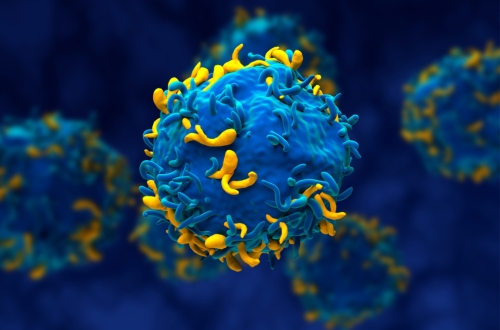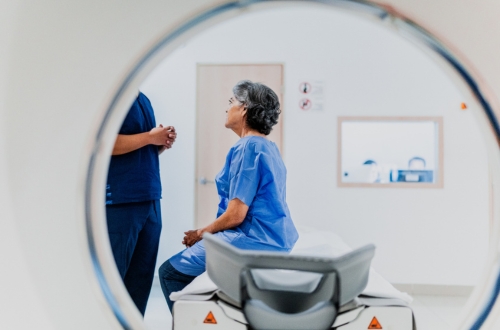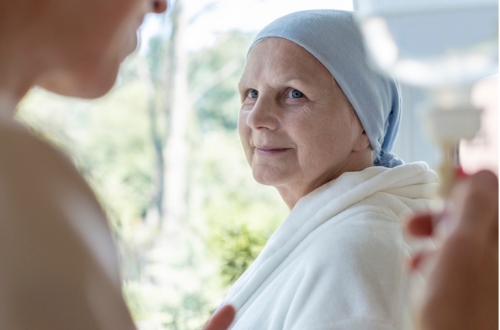Leveraging Real-World Evidence (RWE) in Early-Phase Oncology Research
Data is critical when it comes to clinical research. It informs every decision, from study design to patient selection, and ultimately shapes the trajectory of new therapies from the lab to the clinic. In oncology, where the stakes are particularly high, data-driven decision-making is essential for the successful development of innovative treatments.
However, traditional clinical trial data alone is often not enough to capture the complexities of real-world patient populations and treatment responses. This is where real-world data (RWD) and real-world evidence (RWE) come into play. By incorporating RWE into early-phase oncology research, researchers can gain a more comprehensive understanding of how new therapies perform across diverse patient groups and real-world clinical settings, thereby enhancing trial design and improving patient outcomes.
Advances in healthcare data infrastructure have improved access to RWD for oncology research and increased interest in opportunities to provide RWE where clinical trial data does not exist. RWD is used retrospectively to understand patterns of disease incidence and access to care in early-phase oncology research. RWD is also used prospectively in pragmatic studies, e.g., for comparative effectiveness research.
In this article we explore how RWE can be leveraged in oncology research, particularly for early-phase oncology clinical trials.
What is Real-World Evidence (RWE)?
Real-World Evidence (RWE) refers to clinical evidence derived from the analysis of Real-World Data (RWD). RWD is data collected outside the confines of traditional randomized controlled trials (RCTs) and can come from a variety of sources, including electronic health records (EHRs), insurance claims, patient registries, wearables, and even social media. RWE provides valuable insights into how a drug or therapy works in everyday clinical practice, offering a more holistic view of its safety, efficacy, and real-world effectiveness.
Unlike the controlled environment of a randomized controlled trial (RCT), RWE reflects the diverse patient populations seen in daily clinical practice, including those with comorbidities, varying adherence levels, and other factors that can affect treatment outcomes. This makes RWE particularly valuable in oncology, where patient populations are often heterogeneous and treatment responses can vary widely. By leveraging RWE, researchers can better understand these variations, optimize study designs, and improve patient selection strategies for early-phase trials.
The Role of RWE in Early-Phase Oncology Research
Below, we outline the role in which RWE enhances early-phase oncology research, from refining patient selection and improving study design to providing real-time safety monitoring and supporting regulatory submissions.
1. Enhancing Patient Selection and Recruitment
RWE allows researchers to identify patient populations that more accurately reflect the real-world demographic and clinical characteristics of those who will ultimately receive the therapy. This enhances patient recruitment by targeting those who are most likely to benefit from the treatment, improving both the speed and success rate of early-phase oncology trials.
2. Improving Study Design
Early-phase oncology trials often involve single-arm designs due to ethical and logistical challenges associated with using placebo or standard-of-care controls. RWE can be used to create external control arms, providing a relevant comparator for assessing the efficacy of new treatments. This approach not only enriches the data obtained from the trial but also can reduce the need for large patient populations, making trials more feasible and cost-effective.
3. Monitoring Safety and Efficacy in Real-Time
Real-world data allows for ongoing monitoring of patient safety and treatment efficacy throughout a trial. This real-time data collection enables early detection of adverse events or lack of efficacy, allowing for timely modifications to the study protocol and enhancing patient safety, which is paramount in oncology research.
4. Supporting Regulatory Submissions
Regulatory bodies like the FDA and EMA are increasingly acknowledging the value of RWE in supporting drug approvals and post-marketing surveillance. In early-phase oncology trials, RWE can provide additional evidence to support the safety and efficacy of a new therapy, potentially accelerating the regulatory review process and bringing new cancer treatments to market more quickly.
Randomized Controlled Trials & Leveraging RWE
Randomized controlled trials (RCTs) remain the gold standard of research. However, the generalizability of its findings to patients in routine clinical practice may be limited. RWE leverages data collected about patients receiving routine clinical care outside of the clinical trial settings and provides the opportunity to identify and address evidence gaps. Conventional clinical trials and studies leveraging RWD are broad categories of evidence generation for cancer interventions. Tang et al. highlight the challenges of using RWE, which include the heterogeneity of data sources, lack of timely access to high-quality data, and concerns about the quality of methods leveraging RWD.
Strengths & Limitations of RWE
The strengths of conventional clinical trials include accurate measures of efficacy and acute toxicity of new treatments under ideal conditions, randomization, well-established methodological rules for trial execution, and high internal validity. However, the limitations of such trials include being costly and cumbersome, involving a limited number of patients, having limited external validity as the generalizability of outcomes is constrained by several factors, and having a limited ability to detect rare and long-term side effects.
Strengths of RWE studies include having high external validity and providing evidence of treatment effectiveness in the general population, including populations under-represented in trials. Additionally, RWE studies can be performed relatively quickly and at a low cost (once the data infrastructure is established). Large sample sizes of RWE studies allow the identification of rare events and facilitate extended patient follow-up. A fundamental limitation of RWE research includes susceptibility to confounding and selection bias, methodological complexity, variability in data quality; data may lack key clinical details and information on research endpoints, and comparatively higher levels of incomplete data.
Examples of RWE include:
- Electronic health records (EHR): helps with understanding patient and disease characteristics, treatment, and outcomes in a clinical practice setting
- Health administrative data: provides a measurement of health care utilization and costs and helps identify outcomes of patients with rare events
- Health surveys and registries: improves understanding of health and sociodemographic characteristics of a population
- Cancer registries: help with understanding the natural history of a disease and enable the studying of changes in incidence and prevalence of conditions over time
- Novel sources of RWE: Novel sources such as patient-generated data through wearable devices, health-related mobile applications, and social media platforms all provide direct measurement of patient symptoms, activity, and other outcomes
Applications of RWE in Oncology Research
Potential uses of RWE in oncology research include studying patients under-represented in clinical trials, (e.g., older adults,) examining how routine cancer care differs from clinical trials, studying rare cancers, studying rare and long-term toxicities, and health economic evaluations for cancer interventions2. Additionally, RWE can inform trial design in early-phase oncology research and complement and augment clinical trials.
A recent review of FDA-approved oncology products by Arondekar et al. found that RWE studies used as external controls complemented the efficacy data of single-arm trials. Significantly, RWE can demonstrate unmet therapeutic needs that the investigational cancer drug can address. RWE is especially important for new therapies that target rare but severe illnesses with high unmet needs in oncology, where single-arm trials are often conducted due to a lack of standard of care. Additionally, RWE can be an external control for comparison with an investigational drug. Using historical control data to support clinical trials is of interest, especially given the potential to compress time to approval and increase the availability of therapies.
While RCTs provide precise estimates of treatment efficacy in controlled settings, RWE examines treatment effectiveness in broader patient populations. These two types of evidence are complementary and should leverage their respective strengths, e.g., using RWE to extend clinical trial evidence, to inform trial design, and to integrate directly with clinical trials.
1. Using RWE to extend clinical trial evidence
RWE studies can extend RCT evidence supporting the efficacy of novel cancer therapies by evaluating care patterns and the safety profile of treatment in typical patients. Studies can also leverage RWE to generate evidence not available from RCTs, e.g., rare, long-term, or unexpected toxicities.
2. Using RWE to support clinical trial design
RWE from observational studies may support clinical trial design by providing data on patient characteristics, identifying areas of clinical uncertainty, or generating hypotheses for conducting RCTs. Further, RWE can help trial design and planning through study site selection, providing bases for power calculations, and providing a prior for Bayesian statistical analyses, among other things.
3. Integration of RWE in clinical trials
RWE can be integrated into clinical trials to increase the external validity of results in the real world. For example, long-term follow-up of outcomes is made possible by linking trial participants to RWD sources like health administrative or registry databases that reliably capture endpoints like death. Registry-based RCTs, where patients are identified, recruited, and may be followed up via registries, can leverage information already recorded in pre-existing registries to help identify, enroll, and follow up with patients with minimal effort and costs.
Use of RWE in Cancer Drug Approvals in Europe & the U.S.
The European Medicines Agency (EMA) and U.S. FDA recognize the value of purpose-built evidence generation that supports a complementary role of RWD/RWE to RCTs. A recent study found that RWD/RWE plays a significant role in oncology product development and that they support oncology more than other therapeutic areas.
EMA cancer drug approvals
A study by Eskola et al. on the use of RWD/RWE during the pre-authorization stage of products authorized by the EMA found that RWD/RWE is present in all stages of oncology drug development, namely 100.0% in discovery (i.e., exploring the burden of disease, disease features, and population identification), 37.5% early development, 58.3% in clinical development, 62.5% in registration decision, and 100.0% in post-authorization lifecycle management. In the early phase of oncology research, defining a concise Target Product Profile requires, e.g., critical data on medical need, disease course, and epidemiology of disease occurrence.
The authors highlighted examples that demonstrated that:
- Trial design: supported by RWD/RWE included the use of open-label/single-arm studies, e.g., hemato-oncology studies
- Efficacy: used either comparison of results to historical controls, survey data obtained outside the clinical trial, or expert panel advice
- Safety: using systematic literature review rather than RCT for specific populations such as children where it might not be easy to obtain results from just an RCT
- Effectiveness: comparison of trial results of the cancer drug to standard of care or historical data
- Data collection: A shift in the collection of data on the clinical context (e.g., the natural course of disease, co-morbidities, standard) from post-marketing phase to pre-approval drug development due to RWD/RWE initiatives such as cancer registries
The Impact of the 21st Century Cures Act
Pharmaceutical sponsors have worked with the FDA to use RWE in new drug applications (NDAs) and biologic license applications (BLAs). Following the 21st Century Cures Act of 2016, there has been great interest in understanding RWE from the FDA perspective. In a recent review of NDA and BLA cancer drug approvals by the FDA, researchers found that the median time from investigational new drug (IND) submission to approval of applications:
- With RWE was 5.5 years
- Any expedited program was 6.8 years
- Drugs not in any expedited program was 8.3 years.
The authors surmise that including RWE may help accelerate drug development, specifically highlighting the unmet need.
Precision Oncology & RWE
Precision oncology has fuelled interest in integrating RWE into oncology clinical research as such data can potentially help the adoption of novel therapies into clinical practice. Challenging the data generalizability of traditional clinical trials, precision oncology research requires testing many subgroups, evaluation of real-world drug value, and comprehensive, accessible datasets to validate novel biomarkers.
Increasingly, RWE is seen to fill this gap in research methodology. Clinico-genomic databases like the American Association for Cancer Research (AACR) Project Genomics Evidence Neoplasia Exchange (GENIE), Center for Cancer Genomics and Advanced Therapeutics (C-CAT), and National Datacentre for Cancer Genomic Medicine in Japan integrate clinical information on patient, treatment, and outcomes with results of genomic analysis to inform precision medicine research. An example is the identification of targets for drug development.
Leveraging Specialized Oncology CROs for RWE Integration
To effectively integrate RWE into early-phase oncology research, collaborating with a specialized oncology Contract Research Organization (CRO) is essential. Oncology CROs possess the expertise and resources necessary to collect, analyze, and apply RWE effectively, ensuring that clinical trials are designed and executed to the highest standards.
Partnering with a specialized oncology CRO provides several benefits:
- Deep Expertise in Oncology: Oncology CROs have a deep understanding of the complexities involved in cancer research, including knowledge of the latest therapeutic developments and regulatory requirements. Their expertise ensures that RWE is integrated seamlessly into the clinical trial process.
- Access to Extensive Real-World Data Sources: These CROs often have established relationships with healthcare providers, data aggregators, and patient advocacy groups, giving them access to comprehensive and high-quality real-world data that is crucial for enhancing clinical trial design and execution.
- Advanced Analytical Capabilities: Specialized oncology CROs leverage cutting-edge data analytics tools to extract actionable insights from vast datasets. These insights can help refine study designs, optimize patient recruitment, and improve the overall quality of early-phase oncology trials.
Conclusion
Data is at the heart of successful clinical research, particularly in oncology. By incorporating RWE into early-phase oncology trials, researchers can gain a more nuanced understanding of patient responses to new treatments, optimize study designs, and improve patient safety. Partnering with a specialized oncology CRO, like TFS HealthScience, that can effectively leverage RWE is essential for maximizing the success of these trials and ultimately advancing the development of new and more effective cancer therapies.
TFS HealthScience: Your Oncology CRO Partner
Ready to enhance your early-phase oncology research with the power of Real-World Evidence (RWE)? TFS HealthScience is a global, full-service CRO with a dedicated Oncology & Hematology Unit, specializing in managing clinical trials from Phase I-IV and RWE studies.
TFS also boasts global Real-World Evidence capabilities. With our extensive experience in conducting over 250 RWE studies, we recognize the transformative power of RWE in advancing clinical research. We access various data sources, tools, technologies, and sites to extract the best outcome for your unique project.
Connect with a TFS team member today to discuss how we can support your oncology and RWE services. Get in touch with us now to learn more about our tailored solutions and take your clinical trials to the next level!
Connect with Us
Contact us today to discover how TFS can be your strategic CRO partner in clinical development.



